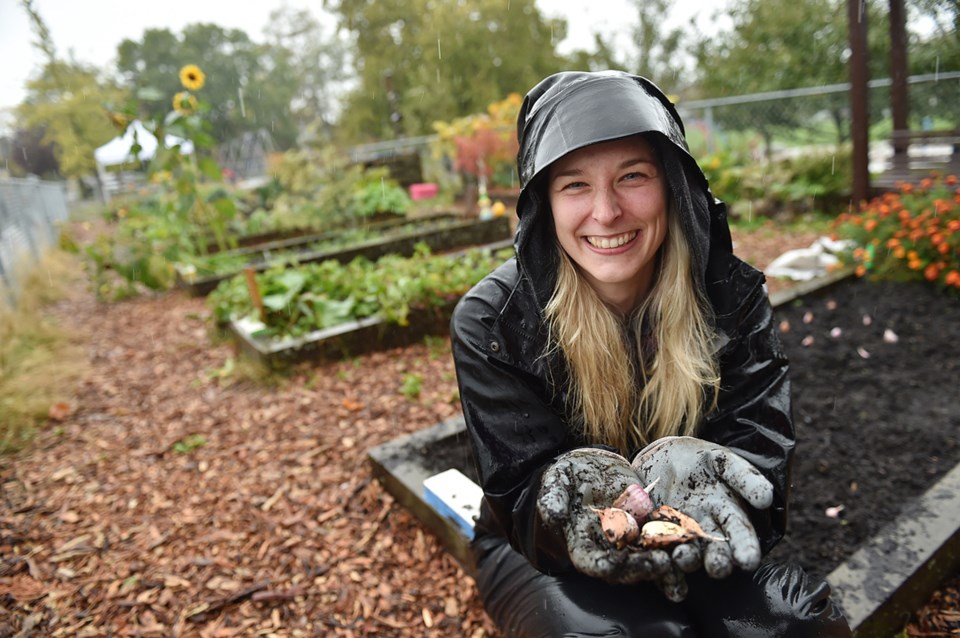Itâs pouring rain as a class of Grade 1/2 students at David Livingstone elementary huddle under a white tent next to the schoolâs garden. The children take turns running, dodging puddles, to a plot at the far end of the garden to plant their garlic cloves, which will sprout and grow over the fall and winter, ready for harvest next spring. Â
David Livingstone is one of several Â鶹´«Ã½Ó³»schools taking part in the Classroom Gardener program. Founder Megan Zeni, who is also an educator â she teaches at a Richmond school as well as provides professional development for teachers â said she designed the program in response to teachers looking for ways to get their students outside.
âThereâs a lot of research globally and locally thatâs telling us about the positive impacts on children,â she told the Courier.
âTeachers are looking for ways to get kids learning outside because they need to get kids moving and thereâs a ton of benefit for childrenâs physical health being outside,â she said, adding that being outside also has mental health benefits.
âWe see huge numbers of children struggling with anxiety in school, so how do we take them outside? Because being outside is very protective against mental health problems in children.â
Zeni adds there are also cognitive benefits from being outside.
âThereâs research that tells us that children will actually do better on academic tasks when they come back inside if theyâve spent time outside,â she said.
The program, which is designed specifically for students in kindergarten to Grade 7, goes well with B.C.âs new school curriculum, Zeni adds. The province introduced the revamped curriculum in 2015, with a full transition for kindergarten to Grade 9 last year.
âIt was really written to be taught outside,â she said. âItâs really complementary to an outdoor classroom.â
Jenna Jaski of Victory Gardens Vancouver, a co-operative of urban growers that has partnered with the Classroom Grower to help facilitate the program at local schools, is all smiles despite spending the morning out in the deluge of rain.
âItâs all about learning as the topic comes up,â she says.
Itâs raining? Talk about weather systems. See a spider and a worm fighting it out? Talk about predator/prey relationships.
âItâs a very different way of learning and I think a lot more organic, pardon the pun,â she says with a laugh. âIt helps kids to ask questions and to be more engaged in their learning process rather than just rote learning and memorizing.â
There are 10 plots in the garden at David Livingstone: one play plot where the students can do whatever they want, except throw dirt, while the other nine contain a variety of plants, flowers and vegetables.
Every class gets to spend time in the garden and by the end of the year-long session, every student will have had a chance to experience all the facets of the garden.
âThroughout the whole year, every student should get to plant a seed, plant a plant, do some thinning of things⦠and harvesting and eating,â Jaski says. âIâm a big proponent of eating in the garden. So our fall harvests at all my schools have had a lot of tasting. Having kids beg for seconds of kale is amazing.â
October is Farm to School month and the Classroom Gardener is just one example of some of the programs taking place at schools throughout the city that see students getting out in the garden, or into the kitchen, growing, cooking and eating locally-grown food.
âFarm to School month is about celebrating and growing the provincial movement focused on supporting our local food system, supporting local farmers and providing fresh, nutritious and culturally appropriate food to our children while at school,â Richard Han, Farm to School B.C. provincial manager, said in a statement. âFarm to School B.C. is successful because we listen to our community partners. Instead of being prescriptive, we support schools to create programs that work for them with the help of local organizations and individuals.â
Started in 2007, Farm to School B.C. is a provincial network that promotes, supports and links Farm to School activities and programs in Â鶹´«Ã½Ó³»and across the province. From school gardens and local food at lunch to farm field trips, the program aims to help students learn about the local food system, teach important life skills and provide the opportunity for students to start forming healthy habits.
To date, Farm to School B.C. has funded programs in 103 schools across the province.
Every October, Farm to Cafeteria Canada â a national organization that aims to bring healthy, local and sustainable food into all public institutions â collaborates with agencies, such as Farm to School B.C., across the country for Farm to School month. It also runs concurrently with Farm to School month in the U.S. This year marks the fourth annual edition of Farm to School month in Canada.



